行政管理学案例分析汇总
郭小聪行政管理学第五版案例分析答案
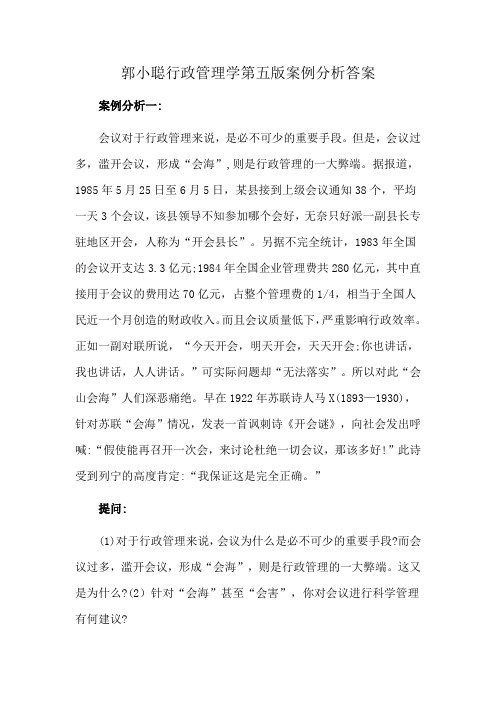
郭小聪行政管理学第五版案例分析答案案例分析一:会议对于行政管理来说,是必不可少的重要手段。
但是,会议过多,滥开会议,形成“会海”,则是行政管理的一大弊端。
据报道,1985年5月25日至6月5日,某县接到上级会议通知38个,平均一天3个会议,该县领导不知参加哪个会好,无奈只好派一副县长专驻地区开会,人称为“开会县长”。
另据不完全统计,1983年全国的会议开支达3.3亿元;1984年全国企业管理费共280亿元,其中直接用于会议的费用达70亿元,占整个管理费的1/4,相当于全国人民近一个月创造的财政收入。
而且会议质量低下,严重影响行政效率。
正如一副对联所说,“今天开会,明天开会,天天开会;你也讲话,我也讲话,人人讲话。
”可实际问题却“无法落实”。
所以对此“会山会海”人们深恶痛绝。
早在1922年苏联诗人马X(1893—1930),针对苏联“会海”情况,发表一首讽刺诗《开会谜》,向社会发出呼喊:“假使能再召开一次会,来讨论杜绝一切会议,那该多好!”此诗受到列宁的高度肯定:“我保证这是完全正确。
”提问:(1)对于行政管理来说,会议为什么是必不可少的重要手段?而会议过多,滥开会议,形成“会海”,则是行政管理的一大弊端。
这又是为什么?(2)针对“会海”甚至“会害”,你对会议进行科学管理有何建议?答案:(1)答案要点:会议对于行政管理来说,是必不可少的重要手段,是因为会议具有相当重要的作用,而这些作用用于行政管理是必不可少的。
会议的作用主要表现在:集思广益,丰富领导经验,提高领导水平;贯彻群众路线,实现人民群众参与国家和社会事务的管理,增强人民群众的主人翁意识和责任感;沟通信息,协调关系等。
适当的会议是必要的,但是会议过多,滥开会议,形成“会海”,则是行政管理的一大弊端甚至“祸害”。
这是因为过多的会议不仅不利于行政效率的提高,反而使大量的时间、精力和财富浪费。
行政人员忙于“开会”而无暇顾及工作。
虽然开会有时也是工作的一部分,但工作绝不是开会。
行政管理案例分析范文
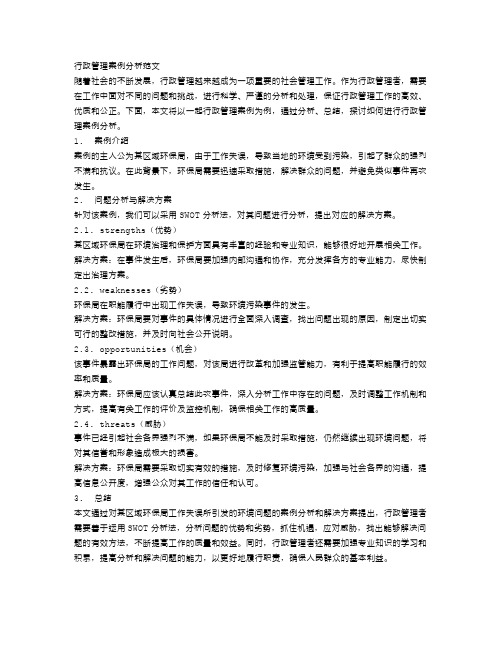
行政管理案例分析范文随着社会的不断发展,行政管理越来越成为一项重要的社会管理工作。
作为行政管理者,需要在工作中面对不同的问题和挑战,进行科学、严谨的分析和处理,保证行政管理工作的高效、优质和公正。
下面,本文将以一起行政管理案例为例,通过分析、总结,探讨如何进行行政管理案例分析。
1.案例介绍案例的主人公为某区域环保局,由于工作失误,导致当地的环境受到污染,引起了群众的强烈不满和抗议。
在此背景下,环保局需要迅速采取措施,解决群众的问题,并避免类似事件再次发生。
2.问题分析与解决方案针对该案例,我们可以采用SWOT分析法,对其问题进行分析,提出对应的解决方案。
2.1.strengths(优势)某区域环保局在环境治理和保护方面具有丰富的经验和专业知识,能够很好地开展相关工作。
解决方案:在事件发生后,环保局要加强内部沟通和协作,充分发挥各方的专业能力,尽快制定出治理方案。
2.2.weaknesses(劣势)环保局在职能履行中出现工作失误,导致环境污染事件的发生。
解决方案:环保局要对事件的具体情况进行全面深入调查,找出问题出现的原因,制定出切实可行的整改措施,并及时向社会公开说明。
2.3.opportunities(机会)该事件暴露出环保局的工作问题,对该局进行改革和加强监管能力,有利于提高职能履行的效率和质量。
解决方案:环保局应该认真总结此次事件,深入分析工作中存在的问题,及时调整工作机制和方式,提高有关工作的评价及监控机制,确保相关工作的高质量。
2.4.threats(威胁)事件已经引起社会各界强烈不满,如果环保局不能及时采取措施,仍然继续出现环境问题,将对其信誉和形象造成极大的损害。
解决方案:环保局需要采取切实有效的措施,及时修复环境污染,加强与社会各界的沟通,提高信息公开度,增强公众对其工作的信任和认可。
3.总结本文通过对某区域环保局工作失误所引发的环境问题的案例分析和解决方案提出,行政管理者需要善于运用SWOT分析法,分析问题的优势和劣势,抓住机遇,应对威胁,找出能够解决问题的有效方法,不断提高工作的质量和效益。
行政管理案例分析

行政管理案例分析概述:行政管理是现代社会运行的基础,在政府和组织管理中起着至关重要的作用。
行政管理案例分析是通过具体的案例来研究行政管理的各个方面,从中总结经验教训,探讨优化管理方法。
本文将通过分析某个行政管理案例,深入探讨行政管理的关键问题以及解决方案,为实际工作中的行政管理提供参考。
案例背景:某市政府部门负责城市公共交通系统的管理。
由于城市的快速发展,公共交通系统面临许多问题,包括车辆拥堵、乘客滞留等。
市政府高度关注这些问题,决定采取行政管理措施来改善公共交通系统的运行效率。
案例分析:1. 问题诊断经过调查研究,市政府发现公共交通系统存在以下问题:a. 车辆拥堵:由于车辆数量不断增加,交通流量大幅度增加,导致道路拥堵现象频发。
b. 乘客滞留:由于车辆拥堵,乘客经常遭遇车辆延误,导致滞留在站点,影响到正常的出行。
2. 解决方案针对上述问题,市政府制定了以下解决方案:a. 优化路线规划:通过对公共交通线路进行优化调整,减少交通拥堵现象,提高整体运行效率。
b. 增加交通信号灯数量:合理增加交通信号灯的数量,使车辆能够更顺畅地通过道路,减少交通阻塞。
c. 引入新技术:引入智能交通控制系统,通过实时监控交通流量,及时调整信号灯配时方案,提高交通效率。
d. 提供多样化的交通方式:推广步行、骑行和共享单车等便捷的出行方式,分散交通压力,减少车辆拥堵。
3. 案例评估通过以上解决方案的实施,市政府取得了一定的成效:a. 交通拥堵现象减少:优化路线规划和增加交通信号灯数量,有效减少了车辆拥堵的情况。
b. 出行效率提高:引入新技术,加强交通流量的监控和控制,使得乘客能够更快速地到达目的地。
c. 多样化交通方式得到推广:步行、骑行和共享单车等交通方式得到普及,减少对公共交通系统的依赖,分散交通压力。
结论:通过本案例分析可以看出,行政管理在解决城市公共交通问题中发挥了重要作用。
市政府采取了多项措施,并通过合理规划和技术手段提高了公共交通系统的效率和质量。
行政管理专业案例分析报告
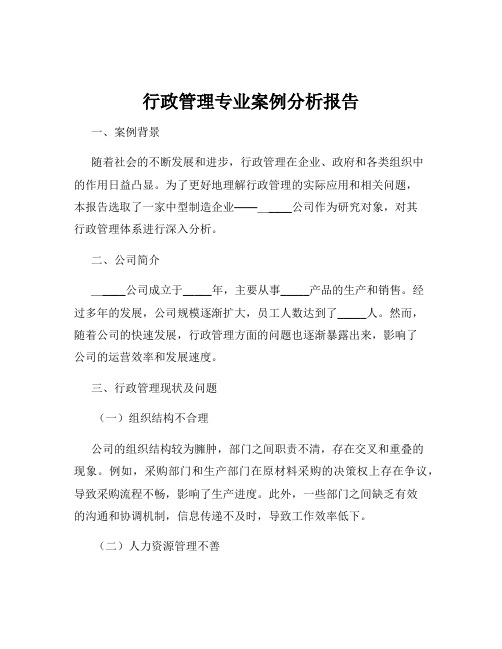
行政管理专业案例分析报告一、案例背景随着社会的不断发展和进步,行政管理在企业、政府和各类组织中的作用日益凸显。
为了更好地理解行政管理的实际应用和相关问题,本报告选取了一家中型制造企业——_____公司作为研究对象,对其行政管理体系进行深入分析。
二、公司简介_____公司成立于_____年,主要从事_____产品的生产和销售。
经过多年的发展,公司规模逐渐扩大,员工人数达到了_____人。
然而,随着公司的快速发展,行政管理方面的问题也逐渐暴露出来,影响了公司的运营效率和发展速度。
三、行政管理现状及问题(一)组织结构不合理公司的组织结构较为臃肿,部门之间职责不清,存在交叉和重叠的现象。
例如,采购部门和生产部门在原材料采购的决策权上存在争议,导致采购流程不畅,影响了生产进度。
此外,一些部门之间缺乏有效的沟通和协调机制,信息传递不及时,导致工作效率低下。
(二)人力资源管理不善公司在人力资源管理方面存在一些问题。
首先,招聘流程不够规范,缺乏科学的人才选拔标准,导致招聘到的员工与岗位要求不匹配。
其次,员工培训体系不完善,培训内容与实际工作需求脱节,员工的专业技能和综合素质无法得到有效提升。
再者,绩效考核制度不合理,考核指标不明确,考核结果不能真实反映员工的工作表现,导致员工的工作积极性不高。
(三)行政管理制度不健全公司的行政管理制度不够完善,存在一些漏洞和不足。
例如,考勤制度执行不严格,员工迟到早退现象较为严重。
此外,办公用品管理制度不完善,存在浪费和滥用的情况。
再者,文件管理混乱,重要文件丢失和泄露的风险较大。
(四)办公自动化水平低公司的办公自动化程度较低,仍然依赖传统的手工办公方式,信息化建设滞后。
例如,文件审批流程繁琐,需要经过多个部门和领导的签字,耗费了大量的时间和精力。
此外,内部沟通渠道不畅,缺乏有效的信息共享平台,导致工作协同难度较大。
四、问题产生的原因(一)管理层重视程度不够公司管理层对行政管理的重要性认识不足,没有将行政管理纳入公司的战略规划中,导致行政管理工作缺乏有效的指导和支持。
行政管理案例分析报告
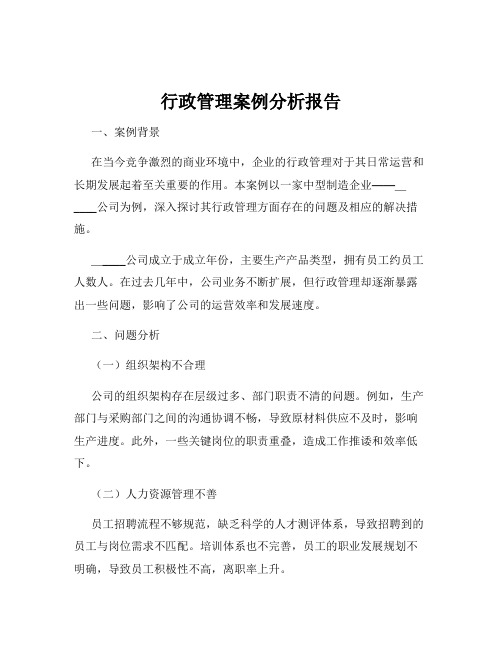
行政管理案例分析报告一、案例背景在当今竞争激烈的商业环境中,企业的行政管理对于其日常运营和长期发展起着至关重要的作用。
本案例以一家中型制造企业——_____公司为例,深入探讨其行政管理方面存在的问题及相应的解决措施。
_____公司成立于成立年份,主要生产产品类型,拥有员工约员工人数人。
在过去几年中,公司业务不断扩展,但行政管理却逐渐暴露出一些问题,影响了公司的运营效率和发展速度。
二、问题分析(一)组织架构不合理公司的组织架构存在层级过多、部门职责不清的问题。
例如,生产部门与采购部门之间的沟通协调不畅,导致原材料供应不及时,影响生产进度。
此外,一些关键岗位的职责重叠,造成工作推诿和效率低下。
(二)人力资源管理不善员工招聘流程不够规范,缺乏科学的人才测评体系,导致招聘到的员工与岗位需求不匹配。
培训体系也不完善,员工的职业发展规划不明确,导致员工积极性不高,离职率上升。
(三)行政管理制度不完善公司的行政管理制度存在漏洞,例如考勤制度执行不严格,请假审批流程混乱。
文件管理也缺乏规范,重要文件丢失或泄露的情况时有发生。
(四)沟通协调机制不畅部门之间缺乏有效的沟通渠道和协调机制,信息传递不及时、不准确,导致工作延误和重复劳动。
例如,销售部门与研发部门之间对于产品改进的需求沟通不畅,影响了产品的市场竞争力。
三、解决措施(一)优化组织架构对公司的组织架构进行重新设计,减少层级,明确部门职责。
建立跨部门的工作小组,加强生产部门与采购部门之间的协作,提高原材料供应的及时性和准确性。
(二)完善人力资源管理规范员工招聘流程,引入科学的人才测评工具,提高招聘的准确性。
建立完善的培训体系,为员工提供多样化的培训课程和职业发展指导,制定合理的薪酬福利制度和绩效考核机制,激励员工的积极性和创造力。
(三)健全行政管理制度修订和完善公司的行政管理制度,明确考勤、请假、文件管理等方面的规定,并加强监督执行力度。
建立文件的分类、归档和备份制度,确保文件的安全和可查阅性。
行政管理案例分析范文_成功励志
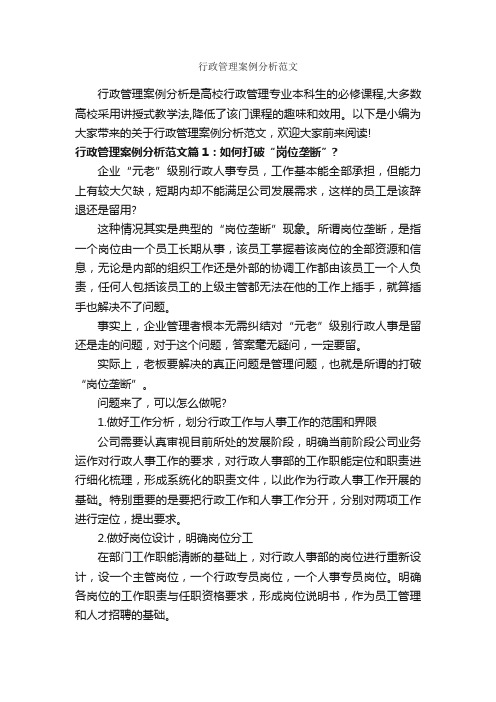
行政管理案例分析范文行政管理案例分析是高校行政管理专业本科生的必修课程,大多数高校采用讲授式教学法,降低了该门课程的趣味和效用。
以下是小编为大家带来的关于行政管理案例分析范文,欢迎大家前来阅读!行政管理案例分析范文篇1:如何打破“岗位垄断”?企业“元老”级别行政人事专员,工作基本能全部承担,但能力上有较大欠缺,短期内却不能满足公司发展需求,这样的员工是该辞退还是留用?这种情况其实是典型的“岗位垄断”现象。
所谓岗位垄断,是指一个岗位由一个员工长期从事,该员工掌握着该岗位的全部资源和信息,无论是内部的组织工作还是外部的协调工作都由该员工一个人负责,任何人包括该员工的上级主管都无法在他的工作上插手,就算插手也解决不了问题。
事实上,企业管理者根本无需纠结对“元老”级别行政人事是留还是走的问题,对于这个问题,答案毫无疑问,一定要留。
实际上,老板要解决的真正问题是管理问题,也就是所谓的打破“岗位垄断”。
问题来了,可以怎么做呢?1.做好工作分析,划分行政工作与人事工作的范围和界限公司需要认真审视目前所处的发展阶段,明确当前阶段公司业务运作对行政人事工作的要求,对行政人事部的工作职能定位和职责进行细化梳理,形成系统化的职责文件,以此作为行政人事工作开展的基础。
特别重要的是要把行政工作和人事工作分开,分别对两项工作进行定位,提出要求。
2.做好岗位设计,明确岗位分工在部门工作职能清晰的基础上,对行政人事部的岗位进行重新设计,设一个主管岗位,一个行政专员岗位,一个人事专员岗位。
明确各岗位的工作职责与任职资格要求,形成岗位说明书,作为员工管理和人才招聘的基础。
3.晋升老员工,招聘新员工对于“元老”级的行政人事,给予晋升机会,晋升为行政人事主管,在工作分工上全面管理部门工作,兼职行政专员岗位,在行政工作方面投入80%的精力,其余20%的精力放在人事工作的监管上。
对于新员工的招聘,主要定位是人事专员,主要任职要求是从事人事工作1年以上,参与人事工作的招聘、培训、绩效、薪酬的几个模块,对人事工作有热情等。
(行政管理)行政管理案例分析

(行政管理)行政管理案例分析第四部分案例分析题1.【案例正文】为改变林业生产中长期形成的林木品种单一、林业生产率低的局面,B县人民政府专门发文,要求全县人民大搞速生丰产林基地建设。
为贯彻县政府的指示,该县林业局立即召开局长办公会议,专门讨论建设丰产林基地的问题,与会的三位局长经过简单讨论,一致决定在该县某区沿江村建设一块面积达200亩的“泡桐”速生林基地。
沿江村有一片200亩的荒滩,这片滩地由于地势低,地下水位高,土壤的碱性重,根本不适合泡桐树的生长。
针对这种情况,在局长办公会议的决策形成后,林业局的林业助理工程师曾专门向局长进谏,要求局长取消这个决定。
可是局长却无视劝告,一意孤行,坚持实施原决策。
于是,林业局便利用省里下拨的林业扶助款,一方面从邻省购树苗,另方面从沿江村召集劳动力,从而正式开始了基地建设。
经过一个月的奋战,作为“样板林”的泡桐速生林基地建成。
然而,至第二年春天,该基地的泡桐树苗却发芽慢、长势弱。
一到夏天,由于基地的地下水位迅速增高,树苗开始大面积枯黄,至年底,树苗已死亡了40%,而到第二年年底,该基地的树苗已全部死亡。
【问题分析】某县林业局建设速生丰产林基地的决策为什么导致失败?该局领导对此是否要负责任?2.【案例正文】A局办公室共有工作人员六人,其中正副主任各一人,干事四人。
多年来,办公室主任老王一直主持办公室的日常工作。
副主任老张平时与办公室其他四名干事一样从事一些具体工作。
当办公室碰到一些较重要的事情时,一般总是由老王、老张两人商量后再布置下去。
总的说来,办公室的工作在这几年里开展得比较顺利。
随着经济体制改革的深入和业务活动的开展,局办公室的工作任务日益增多。
繁忙的工作常常使得四名干事精疲力尽。
老王感到:长期这样干下去不是办法,大家的身体可能搞垮,工作质量也会受影响,按照编制,办公室还可以增加四名工作人员。
于是,老王向局干部处提出了增加办公人员的要求。
不久,干部处在局技术处物色到了工程师老赵。
【案例分析】行政管理学案例库.doc

MID-STATES COMMUNITY SERVICES (A)On Sunday, March 30 a fight occurred in the Club Room, the employees' cafeteria of Mid-States Community Services' Housing Department, between a housing administrator-intern and a building technician. The two men grappled for several seconds, rolling on the floor and throwing punches, until they were pulled apart by two interns and another technician who were standing by when the fight broke out. Aside from a bloody nose and a puffed left eye, the intern who had been fighting emerged unscathed. The technician had a torn shirt and a badly bruised right hand. Both were very angry and were ready to resume the fight if the peacemaking bystanders would only let them go.A series of incidents over the past several weeks had given rise to this outburst, and the events which followed it threatened to throw the entire Department into turmoil, perhaps even to shut it down.Two days after the fight, on Tuesday, April 1, the Associate Director for Administration for Mid-States Community Services, Frank Garrow, reflected on all that had happened the last two days and wondered what might have been done differently. He wondered, as well, what he should do next. The situation was boiling.Before you go on, jot down answers to the following: As Frank Garrow, what more do you want to know before you take action?BackgroundMid-States Community Services is a large, multi-site, multi-service public agency with central offices in a major U.S. Great Lakes port city. The Housing Department, located on the outskirts of the city, was created under special stock for the homeless. It also served as an internship training site for students in a public Administration program at a University nearby who had a special interest in public management. The Departme nt's employees are largely young and divided between the “professional" administrators and the "non・professional" technicians and support staff.This case has been adapted (June 1985) by Dr. Scott Cook, Research Associate, Harvard Business School, and Dr. Dvora Yanow, Lecturer, Harvard Graduate School of Education, by permission of Professor David kuechle, Harvard Graduate School of Education, from a case originally prepared for use in Harvard?s Institute for Educational Management (IEM 9-680-517, Revised 10/80). It is a fictionalized account of actual events. Names, titles, and locations have been disguised.The Club Room was a popular gathering spot for the junior professional staff and interns but was also used on occasion by senior management and the technical and support staff. It consisted of a large, attractive hall in which various hot dishes and snacks were served and a bar area where one could buy soft drinks, beer and wine. The Club Room served hot food from 7 a.m. until 2 p.m. and was generally crowded around the noon hour. It was not as crowded as usual on March 30 when the fight took place.The pugilists were Douglas Jones, an intern, and George Madison, a mid-grade building technician who had been employed by MCS for six years. Jones, an African-American, had recently been a defense halfback on the University of Michigan Big-10 championship football team. He was 6 feet tall and weighed 195 pounds. Madison, a 6'2", 220 pound Caucasian, age 27, was himself an accomplished amateur boxer. Madison often came to the Club Room for a snack at noontime and, on occasion, for a beer before going home at night. He was well-known among the professional staff and sometimes socialized with them. Known as a generous spender, Madison frequently bought rounds of drinks for everyone sitting around the Club Room's semi-circular bar or at a table when he was invited to join a group of housing administrators. He owned awhite Cadillac El Dorado, which could often be spotted in the agency parking lot into the evening hours. Although married, Madison sometimes dated women he met at the Club room.George Madison was one of several full-time building technicians assigned to the Department. He was a member of the technicians9union, one of six unions representing the agency's non-professional personnel. His immediate supervisor was Patrick Mulloney, Head of Support and Technical Services in the Department. Mulloney reported to the Associate Director for Administration, Frank Garrow.The fight between Madison and Jones had probably been brewing for several weeks. Jones and his fiancee, Margaret Vaughn, also an intern, ofter came to the Club Room, sometimes together, sometimes separately. Vaughn, a striking woman, had attracted Madison's attention one day, and he offered to buy her a drink. She accepted, and the two had a friendly conversation. Vaughn became especially interested in Madison when she learned that he was the union steward for technical personnel. The two discussed the union, its history at the agency—how it had been formed and what nature of grievances arose. Vaughn especially wanted to learn about contract provisions dealing with the resolution of disputes. She explained that she hoped to move into labor relations and personnel administration some day and to become an arbitrator. Madison offered to bring copies of the collective bargaining agreements to Vaughn and to let her have copies of various arbitration decisions which had been delivered in the last several years dealing with agency problems.This initial meeting between Madison and Vaughn led to several others, always in the Club Room in the late afternoon and usually accompanied by a few drinks. Madison and Vaughn were often joined by other members of the administrative staff, and Madison soon became something of a folk hero—an attractive, bright individual who was about the same age as the interns but who, 11 years earlier, had dropped out of high school to become a building assistant, then had worked his way through an apprentice program until he became a mid-grade technician and went to work for MCS. Between his earnings from his job with the agency and freelance after-hours work, he made more than many of the professionals at MCS.Madison, in his conversations with the administrators and interns, often expressed regret that he hadn't gone on to college as they had. The administrators and interns, conversely, said they admired Madison: here he was, making more than some of them had earned or stood to earn after graduate school, skilled in what he did, apparently happy and easily able to enjoy all that the community had to offer in terms of social life, stimulating conversation and a relaxed atmosphere in pleasant surroundings. Most of the professional staff, on the other hand, knocked themselves out with long hours and high pressure positions and looked forward to spending the next 20 years trying to pay off their debts.Conversations at the Club Room ran the full gamut and often turned to race relations. Madison had been born and raised in Virginia. His father was president of a local union, and he spent his first two years as an apprentice with that local. According to Madison, all the members were white males, but they often worked on construction jobs with blacks who were unskilled or semi-skilled. Madison recounted many tales about his experiences in Virginia with the plantation owners' philosophy of black-white relationships, a philosophy which he said still existed when he left Virginia in the late 1970s.According to Madison his best friends were blacks—men he met at work, and men and women who associated with amateur boxing in and around the Washington-Baltimore-Richmond area. In conversations at the Club Room the often derided theprofessional staff for having unrealistic attitudes about civil rights, calling them elite snobs who viewed the world from the privileged perspective of the upwardly mobile. "Blacks don't want equal rights," he used to say. “They want to have their own way of life, and they don't want to be measured by white man's standards." He accused black professionals in the Department of being elitists, the same as the whites.These views, of course, often stirred arguments at the Club Room tables, but they were mostly friendly in tone, tempered considerably by Madison's own smiling way. It was difficult not to like him, especially when he offered to buy a round of drinks for everyone.Margaret Vaughn first came to sense that there might be trouble about three weeks before the fight. Madison asked her for a date, and she refused, saying she was engaged to be married. Madison, obviously irritated, walked away abruptly after saying:" What's the matter, aren't I good enough for you?” The next day, as Madison was leaving the Club Room, having stopped during his lunch hour to buy an ice cream cone, he spotted Margaret Vaughn outside, standing with a group of interns. He went up to her, stuck the ice cream cone in front of her face, and said, "Wanna lick my cone?”According to Vaughn he made the gesture in an obscene manner, and she一somewhat surprised and angered一said, “Go away. I am not interested in you!” Madison, in turn, said, "Black beauty! You are that all right. I'll bet you can have any guy you want, any time!” and he walked away.The following week, on March 13, Margaret Vaughn and her fiance, Douglas Jones, went to the Club Room after a meeting, and Madison was there. Vaughn and Jones sat at a table with a few friends, and Madison went over, pulled up a chair, sat down and yelled at the bartender to bring everyone a drink. He then engaged Jones in a conversation. According to Jones, they talked about many things一including football, boxing, race relations and, eventually, Margaret. Three weeks later both men tried to recall the conversation, and their versions were somewhat different. According to Jones,“Madison' inferred' that black women, in general, and Margaret, in particular, were not loyal to a single person. He said further that Margaret and he had dated frequently and that he intended to spend the night with her. I told him to 'bug off' 一to get out and stay away from Margaret一that she didn't want to see him.” Madison recalled the conversation as follows:“Jone said to me -'I understand you've been seeing Margared lately. I just want you to know that she doesn't like it and that I don't either. I suggest you bug off!' I told him I would not bother him or Margaret 一but that I considered myself a friend of everyone there, and I didn't intend to *bug off'. But I got up anyhow and walked away.”That seemed to end things, at least temporarily. However, during the following week Margaret Vaughn asked for an appointment with the head of the Human Resources Office, Dr. Nicholas Herman, a specialist in labor relations. She told Herman that the matter was personal, but she wanted to tell someone, fearing that more serious things might happen. Then she recounted the incidents regarding George Madison, Douglas Jones and herself. Herman agreed with Vaughn that Madison had probably overstepped his bounds. He also agreed that while all employees have a right to frequent the Club Room during lunch breaks and off hours, they have an obligation to treat others with respect.Dr. Herman asked Vaughn what, if anything, he ought to do. Vaughn, in response, said, " I don't think there's anything you can do, but I wanted to talk to someone—to let you know that there could be trouble.” Herman said:“I appreciate that, but I feel helpless. As far as I can see, no one has gone out of control. This man, Madison, may have overstepped his bounds in things he's said and done, but I have difficulty distinguishing between this and a few things that happen between two or more employees that go even further beyond the boundaries of propriety."Vaughn said: “You're right. I think we can handle this ourselves." She thanked Dr. He rman for listening and left, saying, as she departed from his office, “ I'll keep you informed if anything further develops.”Herman replied, “Thank you. I hope this has been helpful.^On Friday, March 28, the Club Room was less crowded than usual. Margaret Vaughn, Douglas Jones, and a close friend of Jones, John Seiler, met there after work. Seiler, a wiry 140 pounder, had been Jones' roommate during graduate school and was also in the internship program. Upon their arrival at the cafeteria, Seiler went to the bar to buy a pitcher of beer. The other two sat down at a table to wait for him. George Madison was shanding alone at the far end of the bar, and when he saw Seiler he walked over to him, shoved him aside, and said, “I'll buy this one." According to S eiler, “ The shove was not a friendly tap!”Madison then paid for the pitcher of beer and took it over to the table where Vaughn and Jones were seated. Seiler followed with a second pitcher of beer plus some bags of nuts and potato chips, and he sat down too. Then, according to Seiler, Madison said: “ This is my party! Why don't you get lost." Siler then said, “We've got business here, and I think you're not part of it.”There is some difference regarding what happened next. However, all four persons reported that Jones got up, grabbed a chair from another table and slid it between where Madison and Seiler were seated. He, Jones, stood in back of the chair and said something to Madison. According to Jones, he said: " Thanks for the beer, George, but we're busy trying to finish a report, and I wish you would leave. You can take the pitcher with you." Madison said he heard Jones say: " I'd like you to leave and stay away from this place. You're not wanted here."Whatever was said, Madison got up from the table and moved toward Jones. Seiler then jumped up, moved between the two and yelled, " Cool it!" Madison turned and walked away, leaving both pitchers of beer on the table. He went back to the bar for a few minutes, then left the Club Room.On Sunday, George Madison was doing overtime, working on a new housing complex not far from the Department office which was scheduled to be opened on Tuesday, April 1. The new complex was to be named after the retiring director of MCS, and dedication ceremonies were to be held the coming weekend, to be attended by the agency's Board of Directors, government officials, directors of other community agencies, other prominent public figures, and neighborhood residents.At about noon Madison drove over the Club Room with Frank Joyce, another technician who had been assigned to the same job. Since it was Sunday, the cafeteria was quiet, open only because of the extra work people were putting in anticipation of the opening and dedication of the new complex. Joyce and Madison had often worked together and were long-time acquaintances. The two went to the cafeteria counter to pick up sandwiches, and Madison noticed Douglas Jones sitting at a table with two other” professionals.^ Jones looked up, Madison looked back, and the two men star ed at each other at a distance while Madison went through the cafeteria line. As he was paying for his lunch at the cashier's desk, he poured a cup of coffee, then he looked back toward Jones, and Jones was still staring at him. So Madison put down his cup of coffee, left his sandwich on the counter, and went over to Jones' table. Jones got up andmoved toward Madison, saying, “Is something wrong?”Madison, in response, said, “Nothing that a fist in the mouth wouldn't solve.”Jones said, “ Do you want to come outside?”Madison, without saying anything, moved toward the doorIt's not clear exactly what was said next. At least three witnesses were there, but no one could state who threw the first punch. Within seconds the two men were on the floor, slugging each other. Jones' two companions leapt up and tried to break up the fight, and they were joined by Frank Joyce, the technician. Eventually, the three succeeded in breaking up the men—two of them holding onto Jones and telling Madison to back off. Joyce stood in front of Madison——then backed him away after saying, "If you're going to hit him, you've got to hit me first." Aftermath At about 3 p.m. on Sunday, Thomas Hotchkiss, Head of Internships and Training Programs for MCS, received a phone call at his home. It was James Robertson, Acting Coordinator of Internships. Robertson, apologizing for calling Hotchkiss at home, told him about the fight一relating the story told him by Doug Jones and his two companions. He traced the events of the last several weeks and said that he, Robertson, and a few of the interns would like to meet with Hotchkiss as soon as possible on Monday—that the situation was hot, and many people were in an uproar about George Madison's conduct. Hotchkiss, after listening to the account, said:“ In my opinion this man Madison ought to be removed from the Department tomorrow morning." Hotchkiss agreed to meet the managers at 2:30 p.m. on Monday and said that in the meantime, he would contact Patrick Mulloney, Madison's supervisor, and ask him to suspend Madison until further notice.By the next morning一Monday, March 31一word had passed quickly about the fight the day before, and many said they were not surprised. Some called Madison a “troublemaker”,a "nigger baiter”,“sexist." And some related oth er instances where he had gotten into near-fights——making advances to women, sometimes doing things that were interpreted as obscene. All of this was passed on to Hotchkiss at the 2:30 meeting, which was attended by James Robertson, Douglas Jones, John Seiler, Margaret Vaughn, and six other members of the professional staff. AH except Robertson and Seiler were black.Hotchkiss told them that he had talked to Patrick Mulloney that morning and that Madison was not working that day—having been promised the day off the week before in return for working Sunday. He said, however, that he was scheduled to meet with Mulloney and Madison the next morning, Tuesday, April 1. He essentially repeated to the group what he had said to Robertson the day before一with three qualifiers (underlined in the following quote):Hotchkiss urged them not to take matters into their own hands, promising to meet with them again on Wednesday. They set a 4:00 p.m. date for the Wednesday meeting.The next morning, Tuesday, Patrick Mulloney came to Hotchkiss' office. He said he had talked to Madison about the incident and that Madison wished to apologize to the interns. However, according to Mulloney, Madison claimed that Jones had been the aggressor and that he, Madison, was only defending himself. The rest of the conversation, according to Mulloney, went something like this:Hotchkiss: "I don't for a minute believe that your man was defending himself. I had a dozen staff members in here yesterday, threatening to take things into their own hands, and they were all in essential agreement on the facts. We can't have that man mixing with the professional staff, particularly the interns. He's a menace. In fact, I think he has psychological problems."Mulloney: "Wait a minute, Tom. You haven't heard his side of things. I suggestyou hear him out before coming to any conclusions.”Hotchkiss: "I'm prepared to do that. Bring him over here."At about 10:30 Mulloney returned to Hotchkiss' office along with George Madison. Hotchkiss sat behind his large desk with the bright morning sun shining through the window over his shoulder, directly into the face of Madison as he sat down. Mulloney didn't notice this, and Madison raised no objection at the time. Hotchkiss then told Madison that although they'd never met, he had come to know him through the interns and administrative staff. Mulloney related the rest of Hotchkiss9 words, as follows:“If all I have heard is only 25 percent true, we don't have any need for you around here. The interns are calling you a" nigger baiter/ a" troublemaker/ and have said you're treating our women with disrespect. We're not living in the dark ages here. We had our share of grievances and work actions in the last several years and people like you set them off. I suggest you start l ooking for a job elsewhere, now.”Madison: " Mr. Hotchkiss, there is another side to the story, and I think you ought to hear it."Hotchkiss: "Tell it to Pat [Mulloney]. I have other matters to attend to. Good day."Mulloney: " Tom, I think we'd better talk about this further. There are some things you don't know, and I'm afraid you've overstepped your bounds.”Hotchkiss: " Look. Fve heard enough. The Director doesn't need any more problems than he's got already. These interns are ready to take things into their own hands, and I intend to prevent it. I hope you don't plan to aggravate them any more!"Mulloney and Madison left the office, both of them incensed that Hotchkiss had apparently taken the interns7 stories as being true and was unwilling to listen further. He had hardly let Madison talk at all.Dr. Herman's InvolvementFollowing the meeting between the interns and Hotchkiss on Monday morning, Margaret Vaughn knocked on Dr. Herman's door. He was in his office and listened while Vaughn related the incidents of the previous days. She said the interns and others were upset about Madison's conduct, but they did not want to cause him to be fired. "If he would just stay away from the cafeteria, everything would be all right," said Vaughn.Following Vaughn's visit, Herman called Hotchkiss. He said that interns had informed him about the Madison situation and offered his assistance to Hotchkiss, if he wanted it, in trying to resolve the situation. Hotchkiss thanked Herman and invited him to attend Wednesday's 4:00 p.m. meeting. Herman said he would cancel another appointment and might be a bit late, but that he would be there.The GrievanceFollowing their meeting with Hotchkiss, Mulloney told Madison to take the rest of the day off. Mulloney said that Hotchkiss had no authority to decide who works and who doesn't work in the technical service area, but he didn't want to risk further confrontations between Madison and the interns, at least for the rest of the day.Madison, obviously angry, said, “I'll take off, b ut I expect to be paid for the day."Mulloney: " Well talk about pay when you get back. Come and see me first thing in the morning.”Madison: " I think I'm getting a bum rap. Nobody's heard my side so far. These guys have drummed up a plot against me just because I made pass at one of their women.”Mulloney: "Cool it, George. I agree you've probably gotten a bum rap. But do mea favor, and clear out. And don't hang around the Club Room for a few days. It's foryour own good. These people can be mean, so let's not give them any temptation.”Madison: "O.K. You're the boss. I'll see you tomorrow."Madison checked out, but he went directly to the union office, looking forClarence miller, General Secretary of the Union Council. Miller represented thetechnicians and other unionized employees at Mid-States, who had joined together fornegotiations and had a single collective bargaining agreement.Madison found Miller in his office and said he had a grievance—that he had beensent home for the day by Mulloney and that Hotchkiss, in a kangaroo court earlier thatday, had virtually fired him. He told Miller about the fight on Sunday and about earlierinstances involving Margaret Vaughn, Douglas Jones, and other interns andprofessional sta仟in the Club Room.As steward for the Department's technical crew, Madison had frequent contactwith Miller, and there was a certain fondness of each man for the other. In fact,Madison was extremely popular among members of the non-professional staff, just ashe had apparently been with the professionals. He was a hard worker, and regularly dida little bit extra一helping out the people he worked with, covering for them when theywere sick, under the weather or when they wanted to leave a little early. When hehandled grievances raised by members of the Union Council, he did it with vigor.He often worked in areas of MCS where other employees, unionized or non-unionized, also worked, such as the central dining room, the small library, and thecomputer center and came to know a great many employees by name. Like theprofessionals, the non-professionals knew him to be a generous spender, and they oftenjoined him for a few drinks after work at the Club Room.After hearing Madison's story, Clarence Miller called Mulloney. He askedMulloney if Madison had been suspended or discharged. Mulloney said he didn't know 一that he had told Madison to come and see him the next morning. Miller, in turn, said, “ I hope you know you're sitting on a powder keg. If you take action against Madison,you're going to shut down the whole deal with the union一and that might just shutdown the whole agency."Mulloney: " I know, I know. Keep your shirt on, will you? I want to worksomething out, if I can. Madison's in big trouble, I hope you know. There's more thano ne side to this story, and I don't think any of us knows it all yet.”Miller told Mulloney He'd be in touch with him. Then he hung up and talkedsome more with Madison. He told him to go home for the day and to check with him inthe morning after he saw Mulloney. In the meantime, Miller said he was going to seeFrank Garrow.Meeting between Clarence Miller and Frank GarrowAt 3:30 that afternoon Clarence Miller went to the office of Frank Garrow,Associate Director for Administration. Under the collective bargaining agreementGarrow represented management at all third step grievance meetings involving theunionized staff. This was the final step before arbitration. Since Miller represented theunion members at that stage, these two men had developed a close workingrelationship over the years. Probably no two people were better acquainted with union-management relations at MCS. While they often argued with each other, they also hadgreat mutual respect. Most of their problems were solved before formal grievancesever got to the third step level, because Miller and Garrow tried to alert each other toproblems that were brewing. Garrow, in the spirit of accommodation, gave priority toMiller whenever he asked for a meeting.Garrow: "Did you get a cup of coffee, Clarence?"Miller: "Virginia said she would brew up a fresh pot. I don't understand how a bum like you deserves such a fine woman for a secretary."Garrow: “My wife says the same thing about herself. How do I deserve such fine women? You tell me!"Miller: " We've got a problem, and frankly I'm worried. This one could blow us out of the water.”Garrow: "Are you referring to George Madison?”Miller: "Yes. I gather Mulloney's talked to you already?”Garrow: "Mulloney—hell! The director called. He said some of the black administrators—he mentioned no names—had met him at lunch and asked what we intended to do about the fight. Stafford does not like surprises, and this one caught him cold.,^Miller: "What did he do?"Garrow: " In short, I guess he told them he didn't know anything about it. So they 'briefed' him—saying that George Madison had been getting drunk in the Club Room, making obscene remarks and that he got into a fight on Sunday with one of the interns.I guess he bloodied him up a bit. At any rate, Stafford told them he'd check into it一that he was sure it would be handled in an appropriate manner. Then he called me一madder than helL He does not like surprises!Memories of earlier 'affairs' that went Put of controP still stick in his mind and, as you know, the Board, the high profile government officials and prominent community people are here for the retirement party and dedication ceremonies this week. It's an important time, and the Director doesn't want any embarrassments/^Miller: "Mulloney told Madison to go home for the day——to check with him tomorrow. As I understand, Hotchkiss got involved and told Madison this morning to start looking for another job.”Garrow: " What in hell does Hotchkiss know? It looks like we've got a little organizational problem here."Miller: "I hate to ruin your day, but I thought you had better know.”Garrow: " Thanks. Til be in touch."As Miller was getting up to leave, Patrick Mulloney entered the Associate Director's office carrying three cups of coffee. He asked Miller to stay. The three men talked for the next half hour, Miller making it clear that any disciplinary action against Madison would likely result in a sympathy strike by others― specially if the discipline was severe-Mulloney: "George is a hell of a good worker and a nice guy. But sometimes he turns from Jekyll to Hyde一he's got a fierce temper, thay tell me—specially after a few drinks.Miller: "He's a well-built man. I wouldn't want to tangle with him.”Mulloney: "He won a few amateur boxing titles not too long ago, and he keeps himself in excellent shape.”Garrow: "What's your plan for tomorrow morning?"Mulloney: "That's why I'm here. I need your advice."And that he intended to be there. Upon learning this, Garrow felt somewhat relieved knowing that Herman, a professional colleague, might be able to at least keep Hotchkiss from making commitments as the alleged spokesman for the agency. In addition he might help cool the situation.Meeting of Wednesday, April 2, 4:00 p.m.The meeting took place as scheduled. Those in attendance were Hotchkiss, who。
